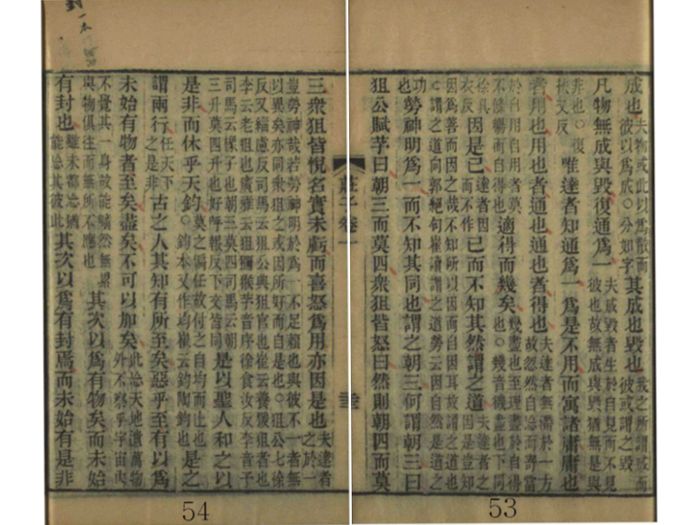"(Translation) 2019 朝三暮四"의 두 판 사이의 차이
| 29번째 줄: | 29번째 줄: | ||
| − | ==='''Student Translation : | + | ==='''Student Translation : Hector Sanchez'''=== |
| + | [We] put under strain our intelligence by making [things] into one yet we do not know if they are [already] the same. This is called “three in the morning.” What is meant by “Three in the morning?” It means [the following:] The monkey master was giving out acorns saying: “Three in the morning. At night, four.” The crowd of monkeys was all angry. He said: “This being so, then, [let us have] four in the morning and three in the afternoon.” The crowd of monkeys was all pleased. | ||
| + | |||
| + | Words and meanings were not damaged, yet happiness and anger were [lit. became] used [by the monkey master.] [This] too is following “this.” Therefore the sage harmonizes them [the monkeys] by means of disputes and comes to rest at the [center of] Celestial Scale. This is called the “two paths.” | ||
| + | |||
| + | From the ''Zhuangzi'', "On Making Things Equal" | ||
| − | |||
---- | ---- | ||
*Discussion Questions: | *Discussion Questions: | ||
| + | 亦因是也: Translating the clause as “[This] too is following ‘this’” makes sense when considering the passage immediately preceding this anecdote (''Zhuangzi''; "On Making Things Equal," 5:) 物無非彼,物無非是。自彼則不見,自知則知之。故曰:彼出於是,是亦因彼。 | ||
| + | “There is nothing that is not a “that”; there is nothing that is not a “this.” One cannot see oneself as a “that,” but if one knows oneself, one knows what it is to be an other. That is why it is said, “That arises from this, and this also relies on a that.” This is the explanation of how this and that are born in the same instant.” (Eno Translation) | ||
| + | |||
| + | |||
| − | |||
2019년 7월 4일 (목) 18:56 판
| Primary Source | ||
|---|---|---|
 |
Title | |
| English | Three in the morning, four in the evening | |
| Chinese | 朝三暮四(Zhao san mu si) | |
| Korean(RR) | 조삼모사(Josammosa) | |
| Text Details | ||
| Genre | ||
| Type | ||
| Author(s) | 莊子(Zhuangzi) | |
| Year | ||
| Source | 《莊子.齊物論》 | |
| Key Concepts | ||
| Translation Info | ||
| Translator(s) | Participants of 2019 JSG Summer Hanmun Workshop (Intermediate Training Group) | |
| Editor(s) | ||
| Year | 2019 | |
Original Script
Translation
Student Translation : Hector Sanchez
[We] put under strain our intelligence by making [things] into one yet we do not know if they are [already] the same. This is called “three in the morning.” What is meant by “Three in the morning?” It means [the following:] The monkey master was giving out acorns saying: “Three in the morning. At night, four.” The crowd of monkeys was all angry. He said: “This being so, then, [let us have] four in the morning and three in the afternoon.” The crowd of monkeys was all pleased.
Words and meanings were not damaged, yet happiness and anger were [lit. became] used [by the monkey master.] [This] too is following “this.” Therefore the sage harmonizes them [the monkeys] by means of disputes and comes to rest at the [center of] Celestial Scale. This is called the “two paths.”
From the Zhuangzi, "On Making Things Equal"
- Discussion Questions:
亦因是也: Translating the clause as “[This] too is following ‘this’” makes sense when considering the passage immediately preceding this anecdote (Zhuangzi; "On Making Things Equal," 5:) 物無非彼,物無非是。自彼則不見,自知則知之。故曰:彼出於是,是亦因彼。 “There is nothing that is not a “that”; there is nothing that is not a “this.” One cannot see oneself as a “that,” but if one knows oneself, one knows what it is to be an other. That is why it is said, “That arises from this, and this also relies on a that.” This is the explanation of how this and that are born in the same instant.” (Eno Translation)